
The Nauvoo Expositor was a newspaper in Nauvoo, Illinois, that published only one issue, on June 7, 1844. Its publication, the destruction of the printed copies, and the destruction of the printing press by the mob who followed the sheriff sent to collect the printed papers, set off a chain of events that led to Smith's death.

Sidney Rigdon was a leader during the early history of the Latter Day Saint movement.
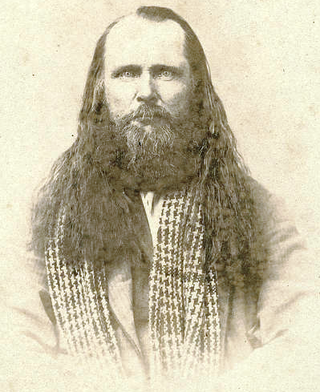
Orrin Porter Rockwell was a figure of the Wild West period of American history. A lawman in the Utah Territory, he was nicknamed Old Port and The Destroying Angel of Mormondom.
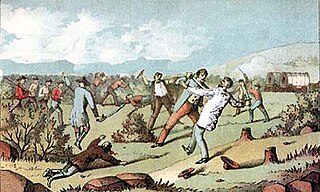
The Danites were a fraternal organization founded by Latter Day Saint members in June 1838, in the town of Far West, Caldwell County, Missouri. During their period of organization in Missouri, the Danites operated as a vigilante group and took a central role in the events of the 1838 Mormon War. There is no evidence that the Danites existed after 1838. However, they remained an important part of Mormon and non-Mormon folklore, polemics, and propaganda for the remainder of the 19th century, waning in ideological prominence after Utah gained statehood. Notwithstanding public excommunications of Danite leaders by the Church and both public and private statements from Joseph Smith referring to the band as being both evil in nature and a "secret combination", the nature and scope of the organization and the degree to which it was officially connected to the Church of Jesus Christ of Latter Day Saints are a matter of some dispute among historians. Earlier in the band's existence, Joseph Smith appeared to endorse the group's actions, but later turned against them as violence increased and the actions of the Danites inspired a hysteria in Missouri that eventually led to the Extermination Order. According to an essay on the website of the Church of Jesus Christ of Latter-day Saints, "Historians generally concur that Joseph Smith approved of the Danites but that he probably was not briefed on all their plans and likely did not sanction the full range of their activities."

Joseph Fielding Smith Sr. was an American religious leader who served as the sixth president of the Church of Jesus Christ of Latter-day Saints. He was the nephew of Joseph Smith, the founder of the Latter Day Saint movement, and was the last president of the LDS Church to have known him personally.

The 1838 Mormon War, also known as the Missouri Mormon War, was a conflict between Mormons and non-Mormons in Missouri from August to November 1838, the first of the three "Mormon Wars".

Hyrum Smith was an American religious leader in the Church of Jesus Christ of Latter Day Saints, the original church of the Latter Day Saint movement. He was the older brother of the movement's founder, Joseph Smith, and was killed with his brother at Carthage Jail where they were being held awaiting trial.
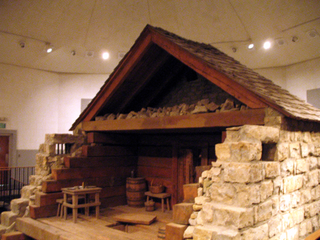
Liberty Jail is a historical jail in Liberty, Missouri, United States, which served as the county jail of Clay County, Missouri between December 1834 and 1853. The jail is known in the Latter Day Saint movement due to the imprisonment of Joseph Smith and some of his associates during the 1838 Mormon War.

Carthage Jail is a historic building in Carthage, Illinois, listed on the National Register of Historic Places (NRHP). It was built in 1839 and is best known as the location of the 1844 killing of Joseph Smith, founder of the Latter Day Saint movement, and his brother Hyrum, by a mob of approximately 150 men. It was added to the NRHP in 1973 and is operated by the Church of Jesus Christ of Latter-day Saints as a historic site with an adjacent visitors' center.
The succession crisis in the Latter Day Saint movement occurred after the death of Joseph Smith, the movement's founder, on June 27, 1844.

Isaac Morley was an early member of the Latter Day Saint movement and a contemporary of both Joseph Smith and Brigham Young. He was one of the first converts to Smith's Church of Christ. Morley was present at many of the early events of the Latter Day Saint movement, and served as a church leader in Ohio, Missouri, and Utah Territory.

Titus Billings was an early convert to the Latter Day Saint movement. He served in several positions in the church and was a contemporary of Joseph Smith and Brigham Young. Billings was a counselor in the first Bishopric of the Church to Edward Partridge. He participated in the Battle of Crooked River and was a colonel in the Nauvoo Legion. He participated in the Mormon migration as a Captain of Fifty in the second company and was a notable settler of Manti, Utah.
Joseph Smith: The Prophet of the Restoration is a 2005 film that focuses on some of the events during the life of Joseph Smith, founder of the Latter Day Saint movement, which was both filmed and distributed by the Church of Jesus Christ of Latter-day Saints. The film was shown in the Legacy Theater of the Joseph Smith Memorial Building from its opening on December 17, 2005 until early 2015, and opened in several LDS Church visitors' centers on December 24, 2005.
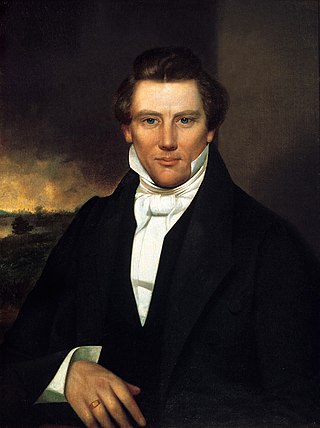
The life of Joseph Smith from 1838 to 1839, when he was 33–34 years old, covers a period beginning when Smith left Ohio in January 1838 until he left Missouri and moved to Nauvoo, Illinois in 1839.
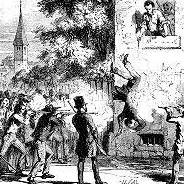
Joseph Smith, the founder and leader of the Latter Day Saint movement, and his brother, Hyrum Smith, were killed by a mob in Carthage, Illinois, United States, on June 27, 1844, while awaiting trial in the town jail.

Reynolds Cahoon was an early leader in Latter Day Saint movement and later, in The Church of Jesus Christ of Latter-day Saints. He was one of the inaugural members of the Council of Fifty, organized by Joseph Smith Jr in 1844.

This is a chronology of Mormonism. In the late 1820s, Joseph Smith, founder of the Latter Day Saint movement, announced that an angel had given him a set of golden plates engraved with a chronicle of ancient American peoples, which he had a unique gift to translate. In 1830, he published the resulting narratives as the Book of Mormon and founded the Church of Christ in western New York, claiming it to be a restoration of early Christianity.

Joseph Smith, the founder of the Latter Day Saint movement, was charged with approximately thirty criminal actions during his life, and at least that many financial civil suits. Another source reports that Smith was arrested at least 42 times, including in the states of New York, Ohio, Missouri, and Illinois.

The following outline is provided as an overview of and topical guide to the life and influence of Joseph Smith:
Garrett Batty is an American film director, writer, and producer known for his film The Saratov Approach. He is a graduate of Brigham Young University and a native of Park City, Utah. He is a member of the Church of Jesus Christ of Latter-day Saints, and his films are part of Mormon cinema, but with a more general audience. He has written, directed, and produced four full-length films, including Freetown (2015) and Out of Liberty (2019), and will begin work on a fifth in 2020. For Freetown, he was awarded the 2015 Ghana Movie Award for Best Screenplay alongside Melissa Leilani Larson.













